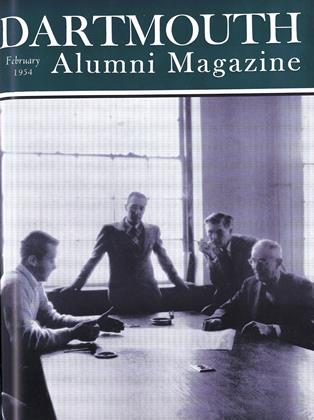A FRESHMAN-YEAR requirement, venerable with age, will no longer be part of the curriculum after the present academic year. The course in Hygiene, required of all freshmen since the turn of the century, and known by a variety of shorter and more colorful names, will be replaced by a new required course, tentatively entitled "The Individual and the College" and designed to help freshmen "to participate responsibly in college life."
The new course, debated over the past five years, is an outstanding example of a curriculum change brought about through the cooperative efforts of faculty and students. "The Individual and the College" will have the general objectives of the course originally proposed as a substitute for Hygiene by the Academic Committee of the Undergraduate Council, and will have a course outline recommended to the faculty Committee on Educational Policy by an ad hoc committee, headed by Prof. James F. Cusick. Professors Davidson, Gramlich and Pollard, Dean Morse, Assistant Dean Kiendl and Milton S. Kramer '54 also served on this special committee.
With the backing of the Committee on Educational Policy and the Executive Committee of the Faculty, the new course was presented to the full faculty on January 20 and was adopted as a substitute for Hygiene 1-2 as a requirement for the degree. "The Individual and the College" will meet twice weekly during the first semester and will carry one semester-hour credit. This will involve a reduction in the degree requirement from 122 to 121 semester-hours beginning with the Class of 1958.
As described by the Committee on Educational Policy, "the first portion of the course is concerned with the student's most effective use of his academic opportunities at Dartmouth; the second with selected topics in physical hygiene; and the third with topics concerning the attainment of maturity, as indicated in social responsibility and in a wholesome emotional and social outlook on life and its problems."
The C.E.P. also had this to say about the general purposes of the course:
It is the judgment of the Committee on Educational Policy, based upon the experience at Dartmouth and elsewhere, that there is a clear need for a more effective way of helping undergraduates to make the transition from home and secondary school to life in a residential college. The Committee recognizes that this problem is exceedingly complex and that there is not likely to be any single solution that will be completely satisfactory. It recognizes also that other actions taken by the College, such as the strengthening of the student counseling and advisory services, may well be of more basic value, especially in individual cases. It believes, however, that the proposed course can help to accomplish three objectives which, in its judgment, are highly important, have educational value, and are not likely to be met by other means. These objectives are:
1. To communicate to freshmen as clearly and effectively as possible at least the elementary concepts of the purposes, opportunities, and meaning of a liberal education.
2. To provide information that will be useful to students in maintaining normal health.
3. To relate what is known about the development of responsible behavior to the problems that confront students in their early college years.
While completely a faculty action in its final stages, the new freshman requirement is nevertheless a tribute to the intelligent and conscientious work of the Academic Committees of the Undergraduate Council in recent years. Probably not since the report on undergraduate education by a senior committee in 1924 have Dartmouth students exerted such a mature and fruitful influence upon the educational program of the College.
 View Full Issue
View Full Issue
More From This Issue
-
 Feature
FeatureDartmouth's Faculty Policies
February 1954 By DONALD H. MORRISON '47h -
 Feature
FeatureTestament of a Teacher
February 1954 By ROYAL CASE NEMIAH '23h -
 Feature
FeatureThe Teacher of Social Science and the World Crisis
February 1954 By JOHN CLINTON ADAMS -
 Feature
FeatureMy "Most Unforgettable Character"
February 1954 By JAMES L. MONTAGUE '28 -
 Class Notes
Class Notes1918
February 1954 By ERNEST H. EARLY, W. CURTIS GLOVER, RICHARD P. WHITE -
 Class Notes
Class Notes1932
February 1954 By JOHN A. WRIGHT, JOHN B. WOLFF JR.







